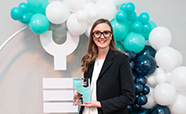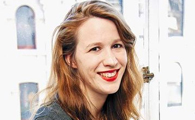To enquire about 2025 postgraduate study in entrepreneurship please email mentr@otago.ac.nz
Introduction to the Master of Entrepreneurship
Learn how to start a business or take an existing business to a new level with the Master of Entrepreneurship programme
The Master of Entrepreneurship degree (MEntr) is a flexible 15 month programme taught in six week block papers, requiring 4 to 5 days of on campus teaching per paper, allowing students to work and live anywhere while completing the degree.
This programme is designed to support and develop entrepreneurial thinking and techniques using the students own business and venture ideas.
The applications of entrepreneurial skills are endless and can be applied across many disciplines including start up ventures and corporate settings.
The MEntr was awarded Outstanding Entrepreneurship Programme Abroad, 2013 by The United States Association of Small Business and Entrepreneurship (USASBE).
The Master of Entrepreneurship programme
Who is the Master of Entrepreneurship for?
The MEntr programme is designed for, but not limited to, four main categories of prospective students.
- Those who have a new venture idea that they want to test and develop
- Current business owners who want to develop their entrepreneurial skills to further grow their venture
- Those who have completed studies across the science, arts and commerce disciplines and are looking to expand their knowledge of business development and entrepreneurship
- Current employees in the corporate sector looking to develop their entrepreneurial skills for use in existing companies and to increase job prospects
How the MEntr programme works
The MEntr programme requires the completion of five compulsory papers plus two additional papers. Each paper runs for six weeks. After this six-week period, the current paper will end and the following paper will begin. All MEntr papers run outside of the University semester timeline and may run in semester breaks.
How the six-week block is broken down:
Week 1: The first week is spent preparing and exploring the required pre-readings and documents. You are not required to be on campus during this time.
Week 2: The second week is spent completing four to five days of on-campus, full-day learning and workshops, running Monday to Thursday/Friday from approximately 9am–5pm each day. You are required to be on campus during this time.
Weeks 3 to 6: The additional four weeks are spent completing follow-up assignments from knowledge provided in week 2. No additional teaching will take place in this period. You are not required to be on campus during this time.
Note: TOUR 416 is taught in the standard semester 1 period with classes occurring once weekly.
Part A | Part B February to May or July to October | |
|---|---|---|
| Compulsory | Plus two of: | Compulsory |
| ENTR411: Introduction to Entrepreneurship Introduction to entrepreneurial concepts. Covers the ideal skills and behaviours required to be a successful entrepreneur | ENTR420: Sustainable Entrepreneurship | ENTR501: Business Project A project based paper in which students prepare a comprehensive report on the development of a new venture that is ready to attract external equity. Student projects |
| ENTR412: Feasibility Analysis Learn to create and evaluate new concepts and business opportunities through concept generation, screening and analysis for success. | ENTR421: Technology and Entrepreneurship | |
| ENTR413: Finance for Entrepreneurs Gain an understanding of concepts and techniques involved in raising new venture capital and private equity as well as broad accounting concepts related to entrepreneurship and business development. | TOUR416: Tourism Entrepreneurship and Business | |
| ENTR414: Marketing in a Digital World Learn marketing principles, branding techniques, inbound marketing tactics, digital tools and skills to evaluate market potential relevant to entrepreneurs. | ||
| ENTR415: New Venture Strategy Learn to plan and manage growth of new ventures, legal and ethical issues affecting new ventures as well as venture exit strategy. | ||
Practitioner orientated teaching staff
More information about the Master of Entrepreneurship
Master of Entrepreneurship information sheet (PDF)
Application criteria
Applicants seeking admission would normally be expected to have a Bachelor's degree (in any discipline) or have an alternative professional qualification. The programme does not assume participants have prior knowledge of any particular business discipline, so the degree is suited to budding entrepreneurs from the arts, sciences and professions as well as Commerce. Satisfactory training or experience in management or business or other entrepreneurial activity would also be considered if it is deemed to be the equivalent of a degree.
Applicants seeking admission to the program would normally be expected to have a Bachelor's degree (in any discipline) with a B/B+ grade average. However, emphasis is also placed on the life experiences and "entrepreneurial talent" of applicants, so a good grade average is not the only entry criterion.
An applicant for the degree will normally be required to attend an interview with the Director of Entrepreneurship.
Graduate profiles

Anna Campbell
Anna is the recipient of the 2021 YES Alumni Awards, Contributor of the Year category, having made a clear contribution to business with value to New Zealand.

Bhavneet Chahal
Bhavneet says her experiences at Otago kickstarted a career helping others learn about IT and realise their potential.

Kendall Flutey
Kendall Flutey was bitten by the entrepreneurial bug early – she was selling class newspapers at the age of seven – and completing a Master of Entrepreneurship only cemented that passion.

Anna Guenther
“My research on crowdfunding showed that there are a lot of niche markets where this could be useful and with the potential for crowdfunding to become a valuable tool for start-ups as well.”

Marcus Hoefliger
“I wanted to undertake a programme that allowed me to apply the theories I learned in my undergraduate degrees to real-life, practical scenarios. The Master of Entrepreneurship was the perfect programme to achieve this.”
Ready to enrol?
Otago Network for Entrepreneurship
Dunedin has a thriving startup ecosystem with information, networks, advocacy and resources available to build companies and new organisations. From creative weekends and innovation networks to co-working spaces, Dunedin is an entrepreneurial city with an exciting startup ecosystem.







